The Electronic Intifada 4 December 2006
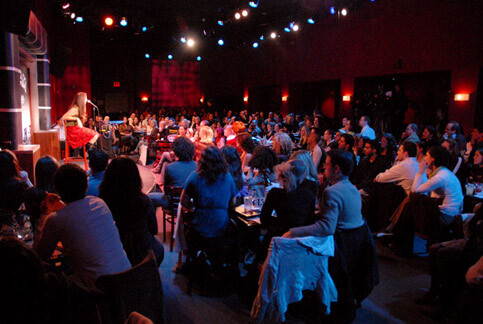
Maysoon Zayid performs for a full house at the Gotham Comedy Club (Photo: nigelparry.net)
“People don’t know anything about us. That’s why we’re doing comedy,” New York Arab-American Comedy Festival co-founder Dean Obeidallah explained at the Festival’s opening night at the Gotham Comedy Club on 14 November 2006. Following sold-out shows in previous years, the 4th Annual Festival extended to six nights, featuring two stand-up comedy nights, a short film night, and three sketch comedy theatre nights (to which a fourth show was added and sold out as well). The week kicked off with a press conference held by the New York Foreign Press Center of the — no joke — U.S. State Department.
Naturally, ignorance towards Arabs was a common theme during the Festival. Obeidallah, for one, was just another “white guy living the white guy life” with friends with names like Monica, Rachel, Ross, and Chandler before September 11, when he became “an Arab.” Responses to his new identity have included, “Oh, you’re Arab. I love hummous,” to “Oh, you’re Arab? What a coincidence - I love Indian food.”

Dean Obeidallah (Photo: nigelparry.net)
Similarly, comedian Suzy Salamy, with Palestinian, Lebanese, and Irish roots has been told, “What an explosive combination you are,” to which she responds that she is a lesbian. Then everyone really knows not to mess with her.
None of the featured talent having a monolithic identity, the comedy of the Festival was broad enough to be enjoyed by all while remaining an opportunity for Arab-Americans to gather and laugh at the often very unfunny issues that impact their lives.
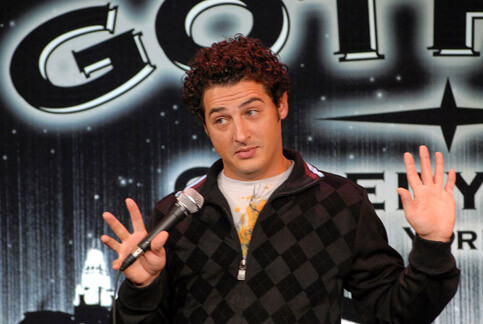
Aron Kader (Photo: nigelparry.net)
Profiling at airports was a subject taken on by many of the comedians. Palestinian-American comedian Aron Kader recalled a desperate phone call from his cousin who has the misfortune of carrying the name Jihad in post-Sept. 11 America. “Jihad called me from the Greyhound station because he can’t fly,” Aron explained. His cousin complained, “ ‘they’re frisking me and ID-ing me … Fuck this shit - I’m changing my name to Raymond.’” Kader deadpanned, “That’s great - your name will be Raymond… Abdul Majid.”
Racism and profiling being obvious subjects for an Arab-American comedy festival, the jokes unfortunately sometimes duplicated each other. Similarly, some of the talent recycled material from last year’s Festival, disappointing when considering that a large percentage of the audience is repeat Festival-goers.
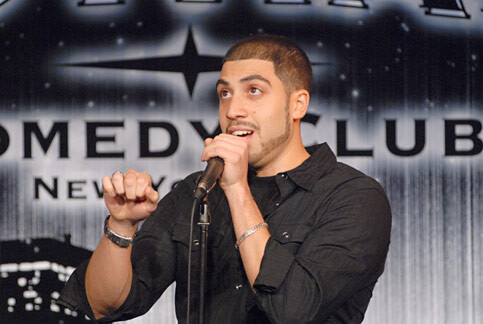
Mohamed Masoud (Photo: nigelparry.net)
However, new talent helped infuse fresh energy into the Festival, which may need to take a deep breath from its own quickly-growing success. Stand-up talent Mohamed Masoud, featured in the New Faces of Arab Comedy Show, stood out from the pack with his descriptions of growing up Arab in an all-black neighborhood in New Jersey (introducing the issue by saying “It’s not just that we’re from the same continent, get racially profiled, and have three legs…”). Looking at race with more nuance than brown versus white, Masoud took a smart, original take on the standard white-versus-black drivers by instead comparing black, Hispanic, and Arab drivers, without falling back on tired cliches.
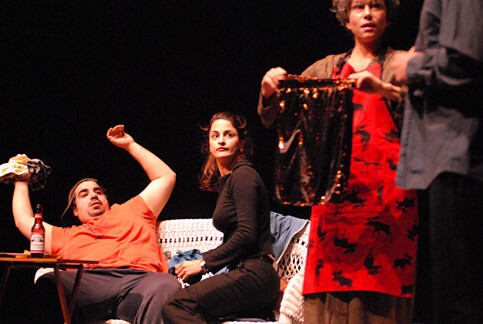
Mike Mosallem, Maya Serhan, Lena Rizkallah and Jake Kader in “Living it up on Long Island” (Photo: nigelparry.net)
Out-of-place immigrant parents were another favorite topic of comedy during the Festival. The short sketch comedy “Living it up on Long Island” could perhaps be described as the Arab answer to “My Big Fat Greek Wedding” with white yuppie guy Doug having married into his wife’s flamboyant Arab family. Called “Dog” instead of Doug by his wife’s nosy mother and non sequitor-dispensing father, one of the high points of the sketch is when Doug enters the living room to find all of his in-laws holding pairs of his boxer shorts (his bewildered mother-in-law only hoping that they aid in the producing of babies).
Palestinian-American Amer Zahr’s description of “boater” (fresh off the boat) immigrants who “have accents and can’t pronounce ‘P’s and ‘V’s” was another take on this theme. He described the typical “boater” household which features a “salon” (otherwise known as the room you’re never allowed to go into), and the kitchen features a drawer of silverware which you are allowed to use and the drawer of silverware forbidden from use. He demonstrated his boater father’s typical answering machine message, during which his father carries on a conversation with him despite his absence, then calling back to say, “Hi Amer, that last message was your father. And this is your father. Call me back at 601 …”
And then of course there was the joke Maysoon Zayid (the self-described “Palestinian Muslim virgin from New Jersey with cerebral palsy”) was told by the same father that frowned upon her stand-up comedy career, confusing it with stripping until he saw her featured on Al-Jazeera. And the joke Maysoon’s dad told his unwed daughter in Arabic? A man is asked by his brother at a funeral, “Why aren’t you’re crying? Your wife is dead.” The man replies, “because it is the first time I know where the whore is going!”
While the stand-up comedy sets were indeed solid (how can one go wrong with the consistently funny Festival co-founders Dean Obeidallah and Maysoon Zayid, the dark humor of Joe DeRosa, and the politically savvy Aron Kader?), the sketch comedy material was more varied.
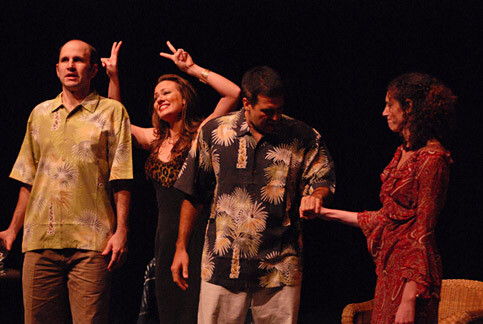
Neil Potter, Leila Sbitani, Joseph Kamal and Lameece Issaq in “Dinner Game” (Photo: nigelparry.net)
Especially funny was the “Dinner Game,” written by Bethel Caram and Neil Potter, and directed by Jon Murphy. The play centers around Lameece Issaq as Alex, the frustrated Arab-American academic trying to humor her husband Phil (played by Neil Potter) as they host Phil’s dyed-in-the-red Texan colleague Jerry (Joseph Kamal) and his genteel wife Courtney (the spot-on Leila Sbitani). Phil, instructing his wife to not talk about “the war, the Lebanese, or your Arabness,” supplies Alex with a list of safe topics that includes “television, baseball, and our love.”
Tension immediately arises when Alex reveals she is an instructor of Middle East studies, and Jerry and Courtney become visibly uncomfortable with the un-American rattan furniture and the serving of hummous (Jerry exclaims, “you didn’t tell me we’d be eating the food of the enemy” while Courtney later asks Jerry in a southern drawl, “what kind of animal is a hum-moose?”). The laughs flew thanks to the sketch’s fast pace and sharp dialogue.

Tamar Vezirian in “Leila Layla” (Photo: nigelparry.net)
Another crowd-pleaser was “Leila Layla,” written by Marie-Thérèse Abou-Daoud and Ahmed Amer (who also direct) and Ahmed Ibrahim. The sketch follows the title character from her birth, through her bullied childhood and later heartbreak, until she comes into her own and rallies to “take back the hummous.”
Written by the Nisaa Arab American Women’s Collective and directed by Maha Chehlaoui, “The Panel” skewered the stereotypes of Arab women held by non-Arabs and Arabs alike — worked best when pushing the stereotypes to the extreme. Leila Buck’s caricature of an enlightened yet apologist Lebanese scholar named Noora Labbad and the dialogue of Sarena Kennedy’s aggressive New York Post reporter (who eventually shouts at the Egyptian-American performance artist being interviewed by Noora, “Can I see your vagina?) earned some of the most laughs.

Ramsey Faragallah and Ryan Shrime in “And now another word from our sponsors …” (Photo: nigelparry.net)
The highlight, however, was “And now another word from our sponsors …” written and directed by Dean Obeidallah, a mock-infomercial featuring Mustafa and Murad, played by Ramsey Faragallah and Ryan Shrime, respectively. Last year Mustafa and his other cousin Marwan were pitching their “How to be a Real Arab” program. But, as not many are seeking that out in this political climate, Mustafa and Murad (Marwan had a run-in with immigration) now offer “How to be a Real American.” As Mustafa frequently reminds us, the program is “now on DVD!”, and complete with fashion advice such as wearing sherbet-colored collared shirts with little animals on them, buttoning up the top four buttons on one’s shirt, and donning their special chest hair cover-up. Hend Ayoub reappeared as Muna, who advises how to date American-style while still maintaining one’s reputation (just make sure that the only thing that goes into your mouth during the date is food).
Covered by the major wire service news agencies, the New York Times, Al-Jazeera, and other media, the Comedy Festival has now begun to set the record straight to as to who these Arab-Americans are, providing the community’s actors with more roles than simply “terrorist” and “generic Mediterranean-looking guy.” The Festival ensures its success by not only tackling, with cathartic humor, the political issues that affect the Arab-American community but by also showcasing universally funny material produced by talent who just happen to be Arab.
Related Links
Maureen Clare Murphy is Arts, Music and Culture editor of The Electronic Intifada. The Electronic Intifada is a proud sponsor of the New York Arab American Comedy Festival.



